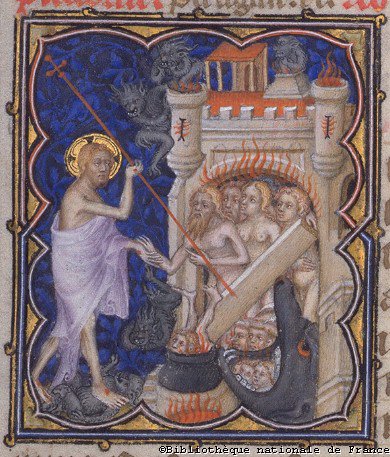A reader asked: “@SRCHicks: can you point to any examples where the greatest haters are priests, as Nietzsche claims? I find this fascinating but aside from the Inquisition and a litany of sexual assault cases against the weakest members of society (children) I can’t tangibly put this together.”
The Nietzsche claim is from Genealogy of Morals (I.7): “The truly great haters in world history have always been priests”. Here are a few sample quotations illustrating what he likely had in mind:
St. Augustine included the spectacle of Hell as one of the viewing pleasures for those in Heaven: “the good go out to see the punishment of the wicked . . . so as to witness the torments of the wicked in their bodily presence” (“The Saints’ Knowledge of the Punishment of the Wicked,” 426 CE).
Church father Tertullian exulted over his imagined destruction of the world and the torments of kings, philosophers, poets, and athletes in Hell:
“that last day of judgment, with its everlasting issues; that day unlooked for by the nations, the theme of their derision, when the world hoary with age, and all its many products, shall be consumed in one great flame! How vast a spectacle then bursts upon the eye! What there excites my admiration? What my derision? Which sight gives me joy? Which rouses me to exultation?—as I see so many illustrious monarchs, whose reception into the heavens was publicly announced, groaning now in the lowest darkness with great Jove himself, and those, too, who bore witness of their exultation; governors of provinces, too, who persecuted the Christian name, in fires more fierce than those with which in the days of their pride they raged against the followers of Christ. What world’s wise men besides, the very philosophers, in fact, who taught their followers that God had no concern in aught that is sublunary, and were wont to assure them that either they had no souls, or that they would never return to the bodies which at death they had left, now covered with shame before the poor deluded ones, as one fire consumes them! Poets also, trembling not before the judgment-seat of Rhadamanthus or Minos, but of the unexpected Christ! I shall have a better opportunity then of hearing the tragedians, louder voiced in their own calamity; of viewing the play-actors, much more ‘dissolute’ in the dissolving flame; of looking upon the charioteer, all glowing in his chariot of fire; of beholding the wrestlers, not in their gymnasia, but tossing in the fiery billows …” (De Spectaculis, written 197–200 CE).
St. Thomas Aquinas echoed Augustine: “In order that the bliss of the saints may be more delightful for them and that they may render more copious thanks to God for it, it is given to them to see perfectly the punishment of the damned” (Summa Theologica, Supplement, Q. 94, Articles 1 and 3; written 1265–1274 CE).
American “Great Awakening” leader Jonathan Edwards gave a 1739 sermon entitled “The Eternity of Hell Torments” with the following disturbing affirmation:
“The sight of hell torments will exalt the happiness of the saints forever.” And: “Can the believing husband in Heaven be happy with his unbelieving wife in Hell? Can the believing father in Heaven be happy with his unbelieving children in Hell? Can the loving wife be happy in Heaven with her unbelieving husband in Hell? I tell you, yea! Such will be their sense of justice that it will increase rather than decrease their bliss.”




